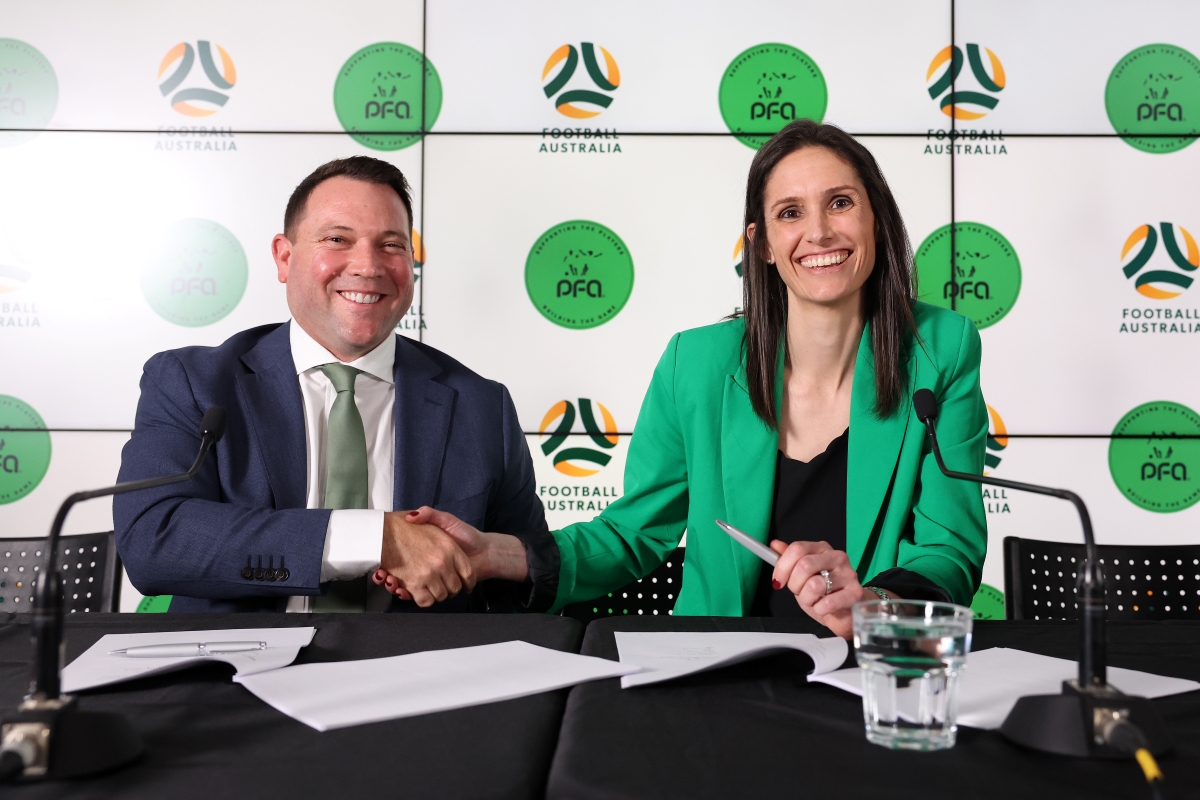The Collective Bargaining Agreement (CBA) between Football Australia and Professional Footballers Australia (PFA) was recently formed for 2023-2027, bolstering the future for the Socceroos and Matildas. The CBA will put a number of key changes and initiatives in place...

The Collective Bargaining Agreement (CBA) between
Football Australia and Professional Footballers Australia (PFA) was recently formed for 2023-2027, bolstering the future for the Socceroos and Matildas.
The CBA will put a number of key changes and initiatives in place - namely payments, commercial partnerships, gender equality, work-life balance and life after football.
As a former Matildas captain, PFA Co-Chief Executive Kathryn Gill has been the perfect role model for those rising up through the ranks, and also in her leadership to turn this CBA into reality.
She spoke with Soccerscene to outline the key milestones achieved for the new CBA and what we can look forward to over the four-year duration.
The path towards the 50:50 payments and the key conversations that made it happen:
Kathryn Gill: Womens football has undergone a global explosion over the past four to five years. When we signed the previous collective bargaining agreement in 2019, the womens game was threatening to reach new heights, and our gender equal model reflected that trend.
In 2023, we needed the new agreement to reflect this new reality, and most players were comfortable moving away from a centralised contract structure to a meritocratic payment model, mirroring the Socceroos match payments.
Players provided direct feedback in player meetings, steering committee meetings, and in the negotiations with FA to share their views.
The outcome was that the players now have a payment model that incentivises performances, creates competitive tension within the team, and is a fit-for-purpose gender-equal payment structure in line with the Socceroos.
There is still work to do to increase player salaries in club football, but we are hopeful that it will continue to grow in line with global trends.
How revenues will benefit the Australian football community with programs for current and former players:
Kathryn Gill: Under the CBA, a percentage of the players share of revenue is redirected into player development support programs and services, which are vital to the ongoing support of players and ensure that football remains a sport of choice for Australian athletes. That money is to support the current national team players. However, for the first time, the CBA guarantees investment in our past players via legacy funding from the 2023 FIFA Womens World Cup.
That funding will ensure our players can stay in their careers longer, help them to prepare for life after football, and enable the PFA and FA to invest in areas that will allow us to support our retired and former professional players better.
The importance of giving back towards the PFA Footballers Trust:
Kathryn Gill: Players are deeply passionate about many issues within football and society, from reducing the cost of football to climate change and human rights. Their aim is to make the Footballers Trust the most impactful sports charity in Australia. The CBA is a great vehicle to foster the players commitment by building a deeper level of impact on many existing and new initiatives across the next four years of the agreement.
There were 40 players in the negotiation process, was there anyone in particular that stood out in discussions?
Kathryn Gill: The CBA is the players' agreement, so as many players as possible in and around the national teams provided their input into their deal.
The players were constantly at the table and in the negotiations, even though many had to join from overseas at various hours of the morning or evening.
Our Executive Committee Members in particular Andrew Redmayne, Lydia Williams, Tameka Yallop, Elise Kellond-Knight, Jackson Irvine and Mat Ryan were deeply involved given their representative roles with the union.
The post PFA Co-Chief Executive Kathryn Gill on the discussions leading up to Collective Bargaining Agreement appeared first on Soccerscene.
View Entire Post



